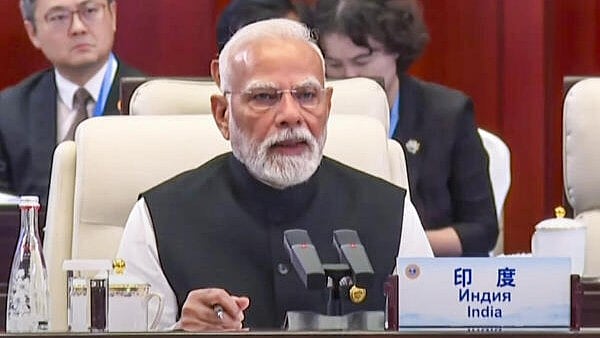
Prime Minister Narendra Modi addresses the plenary session of the 25th SCO Heads of State Council Summit, in Tianjin, China.
Credit: @Narendra Modi via PTI Photo
New Delhi: The double standards on terrorism are unacceptable, Prime Minister Narendra Modi on Monday told the Shanghai Cooperation Organisation’s leaders, who condemned the carnage in Pahalgam in India on April 22 as well as the attacks on a train and on a school bus in Balochistan in Pakistan on March 11 and May 21, respectively.
“Can the open support for terrorism by certain countries ever be acceptable to us?” Modi wondered, tacitly hitting out at Islamabad for its role in the killing of 26 people, mostly tourists, at Baisaran near Pahalgam in Jammu and Kashmir by the terrorists from Pakistan.
“This attack was not only an assault on the conscience of India, but also an open challenge to every nation and every individual who believes in humanity,” he said, addressing the SCO summit, which was hosted by President Xi Jinping of China in Tianjin and was also attended by Prime Minister Shehbaz Sharif of Pakistan.
“We must state it clearly and in one voice: double standards on terrorism are unacceptable. Together, we must oppose terrorism in every form and manifestation. This is our responsibility towards humanity,” Modi said, speaking at the conclave on Monday.
He sent out a message not only to Pakistan but also to China. Beijing’s repeated bids to shield terrorists and terrorist organisations based in Pakistan from the United Nations sanctions have been an irritant in India’s relations with China.
Sharif, too, did not miss the opportunity and told the SCO leaders that Pakistan had “evidence of foreign involvement” in the terrorist attacks in its Balochistan and Khyber Pakhtunkhwa provinces.
He particularly referred to the attack on the Jaffar Express train in Bolan Pass in Balochistan on March 11 and 12 and warned that the perpetrators and their facilitators of such heinous crimes in Pakistan would be severely punished. He also said that Pakistan had made “immense sacrifices” in the war against terrorism.
Islamabad often blamed India for the terrorist attacks in Pakistan. New Delhi, however, always dismissed Pakistan’s bid to play the ‘victim card’ to deflect global criticism over its support for terrorism against India.
“Member States strongly condemned the terrorist attack in Pahalgam on 22 April 2025,” according to the Tianjin Declaration issued by the SCO after the summit. “Member States also strongly condemned the terrorist attacks on Jaffer Express on 11 March and in Khuzdar on 21 May 2025.”
The leaders of the 10-nation bloc expressed their deepest sympathy and condolences to the families of the dead and the wounded. They further stated that perpetrators, organisers and sponsors of such attacks must be brought to justice.
India had responded to the April 22 carnage in J&K by launching “Operation Sindoor” early on May 7 and carrying out precision strikes targeting terrorist camps in Pakistan as well as in areas under illegal occupation of Pakistan.
The Pakistan Army had retaliated, targeting civilians and military facilities in India. The cross-border offensive and counter-offensive had continued till May 10.
When the SCO defence ministers had met in Tianjin on June 26, the 10-nation bloc, led by China and Russia and perceived as a counterweight to NATO, had refused to condemn the terrorist attack in J&K in the joint statement, but had denounced the attacks in Pakistan. Defence Minister Rajnath Singh had lodged a strong protest, and, as a result, the conclave had ended without a joint statement.
The joint statement issued after the SCO summit on Monday, however, condemned the attacks, not only in Pahalgam, but also on Jaffar Express and in Khuzdar.
Even before India launched ‘Operation Sindoor’, China vowed to support its “all-weather ally” Pakistan in “safeguarding its territorial integrity and sovereignty”.
Beijing also supported Islamabad’s call for an impartial probe into the April 22 carnage in J&K, although The Resistance Force, an offshoot of Lashkar-e-Tayyiba based in Pakistan, claimed responsibility for the latest terrorist strikes in India. New Delhi, however, rejected Islamabad’s call for a neutral and international probe, terming it just a delaying tactic.
Pakistan even fired PL-15 missiles made in China at targets in India during the May 7-10 cross-border flare-up between the two South Asian neighbours.
China also purportedly provided satellite support to Pakistan to choose targets in India and to neutralise India’s counterattacks. India’s air defence systems, however, intercepted the missiles fired by the Pakistani Army.
